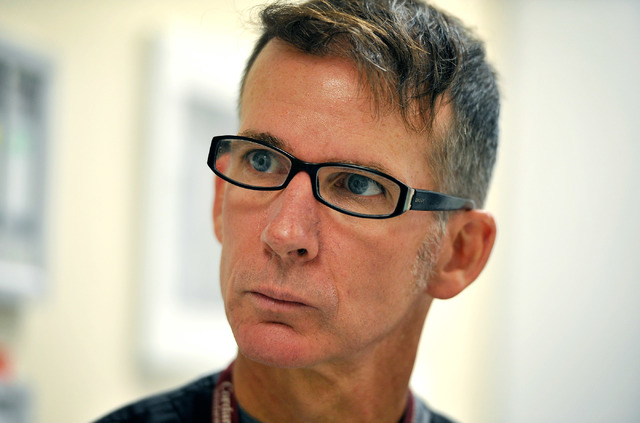Las Vegas HEALS honors six doctors
For the record, Dr. J.D. McCourt lives in the Peccole Ranch section of Las Vegas.
He’s often mistaken as a resident of North Las Vegas, Henderson or some other neighborhood in the Las Vegas Valley because he’s such a zealous distance runner. People see him running near their home and assume he lives nearby.
Having people ask whether he lives in their neighborhood has become a cliche in the emergency room at University Medical Center.
McCourt, the medical director for UMC’s adult emergency department, is just as zealous about his work. That dedication is part of why he is one of six physicians honored this year with an Inspired Excellence in Health Care award from Las Vegas HEALS, a nonprofit organization committed to improving access and delivery of medical care in Southern Nevada. The awards were presented Thursday night at a dinner at Mandarin Oriental hotel at CityCenter.
McCourt oversees arguably the busiest medical department in the state, and colleagues say his innovation, leadership and problem solving has improved the quality of care delivered to people coming to UMC. McCourt credits his doctors, residents and other staff members working in the emergency room, where every shift can be a new adventure in acute illness and trauma.
“We’re thrown a large number of patients, critically ill patients, and we don’t always have a lot of information,” McCourt said.
McCourt was recognized in part for a new protocol he developed for emergency room patients with kidney problems needing dialysis.
During hemodialysis, a machine filters wastes, salts and fluid from the blood when failing kidneys cannot perform that function adequately. Most people with kidney disease receive dialysis on a regular basis, often three times per week. The process can take from three to four hours to complete, even when a patient has an appointment.
After someone comes to an emergency room, the process of collecting blood and urine samples and testing those fluids can take hours. The person is forced to wait until the completion of those tests before treatment can occur.
McCourt noticed how immigrants living in the country illegally and other dialysis patients without insurance were coming to the emergency room about the time they needed dialysis. Some patients know they are due for dialysis based on how they feel. Eleven patients awaiting dialysis were in the emergency department on a recent weekday afternoon.
By cooperating with nephrologists, social workers and administrators, McCourt devised a system allowing for certain patients to receive dialysis without such extensive scrutiny, freeing up space in the hospital for other patients. Patients who previously have received dialysis and have stable vital signs now can be treated without being admitted. Because dialysis is such a time-consuming procedure, McCourt identified that group of patients as the single biggest factor consuming emergency room resources.
Those patients keep coming to UMC because they know they will receive care at the public hospital.
“It’s a difficult situation, but what are you going to do? We can’t turn them away,” McCourt said. “What we have established is probably the best system for creating cost-neutral care.”
His system has reduced hospital admissions of those patients by more than half. Because the patients are stable and their health histories are well-known, adverse outcomes have been minimized.
McCourt led an effort for UMC to be the first hospital in Southern Nevada to offer hypothermia treatment for patients after a heart attack, which cools the body to save brain function. He also devised a rapid medical assessment procedure to reduce the time it takes patients to go from door to doctor, a standard way of gauging the efficiency of emergency rooms. Such improvements in patient care are the ways McCourt leads by example and serves as a role model for all the doctors in the adult emergency department, said Dr. David Obert, his second in command.
“He’s the glue that holds the department together,” Obert said. “He’s the type of leader, when something needs to change, when something needs to be done, he’s the first one to try to find a solution.”
McCourt also was pivotal in establishing Nevada’s only emergency medicine residency program eight years ago. To date, more than 50 emergency physicians have graduated that program, providing specially trained caregivers helping to alleviate the doctor shortage in Nevada.
“He was one of the leaders that provided the planning to get that program going,” said Dr. Deborah Kuhls, the associate dean of academic affairs at the University of Nevada School of Medicine.
As a trauma surgeon, Kuhls and McCourt have collaborated on the same patients. In their 14 years working together, Kuhls also has become familiar with McCourt’s teaching style, calling him an insightful, clear and decisive mentor for the residents under his tutelage. McCourt’s matter-of-fact approach challenges his students to think critically and analytically to arrive at the proper diagnosis for a wide diversity of patients, Kuhls said.
Teaching is one of the aspects of McCourt’s job that he finds particularly rewarding. Working with residents who are roughly the same age from year to year helps keep him young. McCourt also cites the opportunities he has for lecturing and medical research as key components of his job that provide professional satisfaction.
The Chicago Medical School graduate has been at UMC for 20 years, the past six as director of the adult emergency department.
And despite his propensity for crossing the length and breadth of the Las Vegas Valley as a runner, he feels no such desire for professional rambling. The combination of clinical care, teaching and medical research he enjoys in his current job ensures McCourt’s innovation and creativity will continue to benefit Southern Nevadans for years to come.
Contact Steven Moore at smoore@reviewjournal.com or 702-380-4563.



















